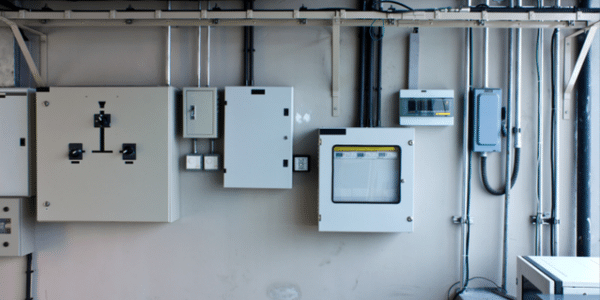How Electrical Fiberglass Boxes Are Revolutionizing the Construction Industry
5/30/20244 min read


Introduction to Electrical Fiberglass Boxes
Electrical fiberglass boxes are a cutting-edge solution in the construction industry, known for their durability, lightweight nature, and resistance to corrosion. Composed primarily of glass fibers embedded in a resin matrix, these boxes are designed to house electrical connections, switches, and outlets safely and efficiently. The use of fiberglass as a material for electrical enclosures marks a significant shift from traditional materials such as metal and plastic.
Historically, electrical boxes have been constructed from metal, typically steel or aluminum, due to their strength and conductivity. However, these materials are prone to rust and corrosion, particularly in harsh environmental conditions. Plastic, another common material, offers resistance to corrosion but lacks the structural integrity and high-temperature tolerance required for many applications. In comparison, fiberglass electrical boxes provide a unique blend of benefits, combining the best aspects of both metal and plastic while introducing new advantages.
Fiberglass is inherently resistant to rust and corrosion, making it ideal for use in environments where moisture and extreme temperatures are prevalent. Additionally, the lightweight nature of fiberglass reduces the overall weight of electrical installations, facilitating easier handling and faster installation processes. This is particularly beneficial in large-scale construction projects where efficiency and labor costs are critical factors.
Furthermore, electrical fiberglass boxes exhibit excellent electrical insulation properties, which enhance safety by minimizing the risk of electrical shocks and short circuits. The material's fire-resistant characteristics also contribute to safer installations, capable of withstanding high temperatures without degrading. These attributes make fiberglass a superior choice for electrical enclosures, particularly in demanding applications such as industrial settings, outdoor installations, and areas with stringent safety requirements.
As the construction industry continues to evolve, the adoption of innovative materials like fiberglass for electrical boxes represents a significant advancement. This shift not only addresses the limitations of traditional materials but also paves the way for more reliable, efficient, and safe electrical installations.
Advantages of Electrical Fiberglass Boxes
Electrical fiberglass boxes are becoming increasingly popular in the construction industry due to their numerous advantages over traditional materials like metal and plastic. One of the most significant benefits is their superior durability. Unlike metal, which can rust and degrade over time, fiberglass is resistant to corrosion, making it an ideal choice for long-term applications. This resistance to environmental factors extends the lifespan of electrical installations, reducing maintenance costs and downtime.
Another notable advantage is the lightweight nature of fiberglass. This property not only makes transportation and handling easier but also simplifies the installation process. Contractors can install these boxes more efficiently, which can significantly reduce labor costs and project timelines. Despite being lightweight, fiberglass offers exceptional strength and durability, making it a reliable choice for a variety of applications.
Fiberglass boxes are also non-conductive, which enhances safety in electrical applications. Unlike metal boxes, which can conduct electricity and pose a risk of electrical shock, fiberglass is an insulator. This non-conductive property makes fiberglass boxes inherently safer for both installers and end-users, particularly in residential and commercial settings where safety is paramount.
Furthermore, electrical fiberglass boxes can withstand harsh environmental conditions, including extreme temperatures, moisture, and UV exposure. This makes them suitable for both indoor and outdoor use, as well as in challenging environments such as industrial sites or coastal areas. Their ability to remain intact and functional under these conditions ensures that electrical systems remain safe and operational.
Real-world applications have demonstrated these advantages effectively. For instance, in coastal construction projects where saltwater corrosion is a major concern, fiberglass boxes have proven to be a resilient alternative to metal. Similarly, in industrial settings with high humidity and temperature fluctuations, the durability and non-conductive properties of fiberglass have provided significant safety and performance benefits.
In summary, the advantages of electrical fiberglass boxes—ranging from their durability and corrosion resistance to their lightweight nature and ease of installation—make them an excellent choice for modern construction projects. Their non-conductive properties and ability to withstand harsh conditions further cement their role as a revolutionary material in the construction industry.
The construction industry has seen a significant transformation with the introduction of electrical fiberglass boxes. These advanced enclosures are paving the way for more efficient, safe, and sustainable building practices. One of the primary advantages of fiberglass boxes is their long-term cost-effectiveness. Unlike traditional metal or plastic boxes, fiberglass boxes are highly resistant to corrosion and environmental wear and tear, leading to reduced maintenance and replacement needs. This durability translates to substantial savings over the life of a project, making them a smart investment for construction firms.
Safety is another critical area where electrical fiberglass boxes excel. They are non-conductive, which reduces the risk of electrical shock to electricians and construction workers. This property is particularly beneficial in environments where electrical safety is paramount, contributing to a safer worksite and compliance with stringent safety regulations. Moreover, their robust construction withstands harsh conditions, enhancing the overall safety of electrical installations.
From an efficiency standpoint, the lightweight nature of fiberglass boxes simplifies handling and installation. This ease of use can significantly reduce labor time and associated costs, improving project timelines and productivity. The versatility of these boxes allows them to be used in various applications, further streamlining the construction process and minimizing delays.
Sustainability is increasingly becoming a focal point in the construction industry, and fiberglass boxes are making a notable contribution. Their extended lifespan means fewer replacements and less waste, aligning with green building practices. Additionally, many fiberglass boxes are made from recyclable materials, adding to their eco-friendly credentials. This sustainability aspect not only benefits the environment but also enhances a company's reputation for responsible construction practices.
Looking forward, the use of fiberglass in construction is poised for further innovations. Advances in material technology could lead to even more durable and versatile applications, potentially integrating smart technologies for enhanced functionality. As the industry continues to evolve, electrical fiberglass boxes will undoubtedly play a crucial role in shaping the future of construction.
